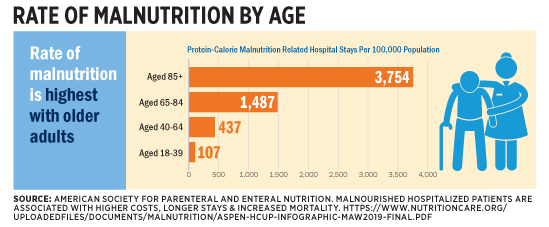Fighting Malnutrition and Thriving in Your Golden Years
Talking about aging can feel taboo—but it shouldn’t be. After all, 60 is the new 50! With life expectancy steadily rising since 1950, many of us are living longer, more active lives. However, as we grow older, one critical but often overlooked concern is malnutrition hidden health issue that affects millions of older adults.
The Silent Crisis: Malnutrition in Older Adults
According to the American Society for Parenteral and Enteral Nutrition, disease-related malnutrition in the elderly accounts for the majority of malnutrition cases in the U.S. As our average life expectancy approaches 79 years (per the 2022 World Population Prospects report), more and more adults are choosing to age in place, remaining in the comfort of their own homes.
Good nutrition supports energy, mobility, mental sharpness, and a strong immune system. Yet many seniors—especially those who live alone, may not get the nutrients they need every day. ABC’s home health aides are here to help.
We are living longer in our golden years with an average age of 79 years old per the 2022 Revision of World Population Prospects, many older adults will decide to age in place in the comfort of their own home. Making the decision to age in place is critical to planning for your future just like making the decision to reinvent yourself and being the best version of YOU is essential to your quality of life!
September is Healthy Aging Month and during this month we want to help you embrace your golden years because these truly can be the best years of your life!
Your health should always be your top priority and this includes everything from keeping up with regular medical & specialist appointments, dental cleanings, exercising as much as possible, and of course nutrition.
Warning Signs of Malnutrition:
- Unintentional weight loss
- Loss of appetite
- Noticeable changes in food intake
- Physical symptoms like thinning hair, dry skin, or swelling
- Cognitive changes: confusion, apathy, irritability
- Persistent fatigue or weakness
- Social withdrawal
- Side effects from medications affecting appetite
- Chronic health issues interfering with nutrient absorption
So, What Can We Do?
Malnutrition isn’t always obvious—but it has real consequences. Fortunately, there are several ways to take control and support nutritional wellness:
- Encourage Balanced Meals: Prioritize fruits, vegetables, lean proteins, whole grains, and low-fat dairy.
- Choose Nutrient-Dense Snacks: Offer easy options like yogurt, nuts, or sliced fruit between meals.
- Boost Caloric Intake Safely: Add healthy fats like avocado, olive oil, or nut butter for those with a reduced appetite.
- Smaller, Frequent Meals: Multiple light meals can be easier to manage than three heavy ones.
- Stay Hydrated: Dehydration is common in older adults. Make water intake a priority.
- Incorporate Physical Activity: Gentle movement like walking or yoga can improve appetite and support muscle tone.
But That’s not all
Believe it or not, proper nutrition has outside influences, social support, mental wellness and a sense of community can directly help in maintaining health and wellness as we age. Nutrition isn’t just about food—it’s also about how you feel. A sense of purpose, belonging, and joy can influence your appetite, energy, and health.
Feed Your Mind, Too
What are your passions? Whether it’s reading, painting, dancing, or learning an instrument—creative and intellectual pursuits stimulate the brain and nurture the spirit. Consider joining a book club, trying your hand at gardening, or exploring a new hobby like pottery or puzzle-solving. When you feel connected and your social and mental wellness are stimulated, your cravings have the tendency to follow.
What excites you?
If you don’t already have a “bucket list,” try creating one! It doesn’t have to be anything crazy…it just needs to exist!
Think of some activities you have always wanted to do or places that you have always hoped to visit and write these things down- you will feel more compelled to action these items if they are written down. Sometimes the greatest satisfaction can be “crossing things off the list.”
Also, t’s never too late to learn a new skill which is excellent for your mind! Perhaps you have always wanted to learn how to play an instrument or have always enjoyed building things or really wished you could speak another language…these things and many more are an incredible way to spend your time in retirement and beyond! Get out there and explore! Your appetite will thank you.
Are you able to stay connected?
Getting involved in your community, if you are not already, is vital to aging well!
Retirement can be a tricky time for some folks as some adjust from their busy routines and what they used to consider their norm to a new “normal” where things now move at a slower pace. If you are looking to keep busy but don’t want the stress of a full-time, 40-hour-a-week position, getting a rewarding part-time job can be a great plan. Many employers, like ABC Home Healthcare Professionals, would love to discuss part-time employment opportunities with you! At ABC Home Healthcare Professionals, the work is deeply rewarding, and you can make a difference in the lives of seniors in and around your community. Not only does ABC offer the flexibility for part-time employees to choose their own schedule and decide where they want to work but we also offer generous hourly pay and mileage reimbursement!!
If the commitment to a part-time job seems too intimidating, giving back to your community will make you feel good and will also help connect you with other like-minded individuals. Being active in your community and/or volunteering helps you expand social circles and make new connections. A great way to get connected is through either your local senior center/council on aging or an adult day program.
Local institutions, such as your town or city’s library, will also host events that they welcome the public to participate in so be sure to check in regularly!
If you have a close group of friends, a solid number of acquaintances or even family members who live nearby, try coordinating a book club or card club and meet either bi-weekly or monthly (whichever frequency you prefer). If that isn’t your “thing,” maybe meet for a monthly meal to catch-up and put that on the calendar. It is always nice to have something to look forward to!
Your golden years are all about YOU and, believe it or not, YOU are in control of your life and what YOU make of it- make it GREAT!


